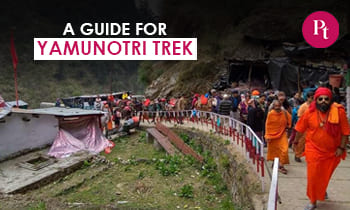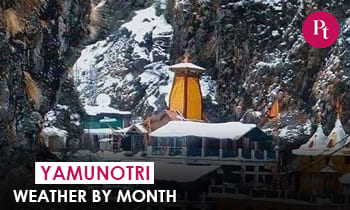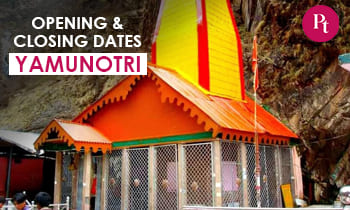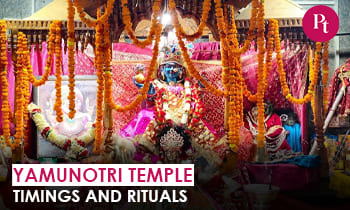Yamunotri Temple, nestled in the Garhwal Himalayas of Uttarakhand, India, is a sacred Hindu shrine dedicated to Goddess Yamuna. This revered temple is one of the Char Dham destinations and holds immense religious significance for devotees who embark on a pilgrimage to attain spiritual bliss. The temple’s timings and rituals play a crucial role in shaping the spiritual experience for the pilgrims.
- Entry Fee: No entry fee

Yamunotri Temple Timings
| Temple Timings | Opening Time | Morning Aarti Time | Morning General Darshan | Evening Aarti | Evening General Darshan | Closing Time |
| Yamunotri Temple | 6:00 am to 8:00 pm | 6:30 am to 7:30 pm | 07:30 am – 12:00 pm | 06:30 pm – 07:30 pm | 02:00 pm – 08:00 pm | 12:00 pm to 2:00 pm |
Points to Note
- Yamunotri Temple generally opens its doors to the devotees in late April or early May, marking the beginning of the annual pilgrimage season. However, these dates may vary based on the Hindu calendar and climatic conditions.
- The temple remains accessible to pilgrims until the onset of winter, typically closing around the sacred day of Diwali.
- The standard daily schedule of the temple begins early in the morning with the Mangala Aarti, a ritualistic prayer conducted during the auspicious hours before sunrise.
- Pilgrims eagerly gather to witness and participate in this divine commencement of the day. Following this, the temple opens for darshan (divine viewing) to the devotees.
- The temple remains open for a few hours during the morning and closes in the afternoon. It reopens for the evening rituals, allowing the devotees another opportunity for darshan.
- The timings may vary slightly, and pilgrims should check the updated schedule before planning their visit.
- No Entry fees are required for Yamunotri Temple
- Photography and Videography in the temple are not allowed.
Rituals at Yamunotri Temple
Mangala Aarti
- The day at Yamunotri Temple begins with the Mangala Aarti, conducted before dawn. The rhythmic chanting of Vedic hymns and the ringing of bells create a serene and spiritual atmosphere. Devotees believe participating in this early Morning Prayer brings blessings and divine grace.
Darshan
- The primary purpose of visiting the temple is to have darshan of the deity, Goddess Yamuna. Pilgrims wait patiently in queues to catch a glimpse of the sacred idol. The darshan is considered a deeply personal and spiritually enriching experience, fostering a connection with the divine.
Ganga Snan
- Before entering the temple, devotees often take a holy dip in the Yamuna River, a ritual known as Ganga Snan. The belief is that the purifying waters of the river cleanse the body and soul, preparing the devotee for the sacred encounter with the deity.
Yamuna Pooja
- Special pujas are conducted throughout the day to honor Goddess Yamuna. The priests perform intricate rituals, including offering flowers, incense, and sacred chants. The fragrance of burning camphor and the resonance of the mantras create an otherworldly ambiance within the temple precincts.
Aarti
- The evening Aarti is a mesmerizing spectacle, with the temple adorned with lamps and the riverbank illuminated. Devotees gather for the evening prayers, expressing their devotion through the synchronized singing of hymns and the waving of lamps. The Aarti is a visual and auditory treat, captivating the senses of those in attendance.
Bhajan Sandhya
- Devotional music, or Bhajan Sandhya, is often organized in the temple premises. Renowned musicians and singers perform devotional songs, creating an enchanting atmosphere that resonates with spirituality. Pilgrims actively participate, adding their voices to the collective expression of devotion.
Closing Ceremony
- The temple concludes its daily activities with the Sayana Aarti, performed just before closing for the night. This ritual marks the symbolism of putting the deity to sleep, signaling the end of the day’s worship. Devotees witness this serene event, feeling a sense of peace and divine connection.
Yatra to Divya Shila
- Pilgrims often extend their visit to Yamunotri by undertaking a trek to Divya Shila, a rock pillar near the temple. It is believed that this pillar is a manifestation of the divine, and devotees offer their prayers and seek blessings at this sacred spot.
Yamunotri Temple’s timings and rituals create a harmonious blend of spiritual discipline and devotion, providing pilgrims with an opportunity to connect with the divine and seek solace in the lap of the Himalayas. The sacred ambiance and the breathtaking natural beauty surrounding the temple make the pilgrimage to Yamunotri a transformative and unforgettable experience for all who undertake this sacred journey.













 Call
Call WhatsApp
WhatsApp Enquiry
Enquiry